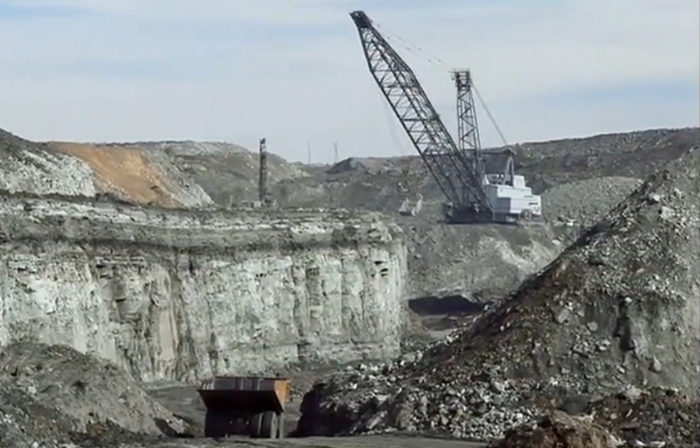
Image Credit: Butz / CC BY 2.0 / Flickr
Regulators in Appalachia are worried that coal companies forced into bankruptcy won’t have enough money to pay for reclaiming stripped mountain tops and polluted rivers, leaving taxpayers to pick up at least some of the tab.
According to an article in The New York Times, cleanup costs could amount to $1 billion. While the industry says that its cleanup plans are financially sound, states such as West Virginia aren’t so sure.
There, the state has brought in an outside lawyer, Kevin Barrett, and named him a special assistant attorney general as it wrangles with Alpha Natural Resources over its legal obligations for cleanups. Alpha, now in bankruptcy, plans to earmark a total of $209 million for cleanup in five states, including West Virginia, but Barrett doesn’t think that’s enough money. Another problem: Alpha is depending on future coal sales to add to the pool, but the industry doesn’t show much potential for that.
Alpha borrowed heavily to buy Massey Energy in 2011, but when the coal market collapsed, Alpha was forced by its debt to seek bankruptcy protection. The same factors — low natural gas prices that ate into sales, tougher environmental regulations, and slumping sales in China — also have affected other coal companies. Peabody Energy, the world’s biggest private-sector coal producer, filed for bankruptcy in April after losing $2 billion last year.
West Virginia’s problems are especially acute. The Times said that many of its coal mines are scheduled to close and environmental remediation will be costly. Damage from stripping away mountain tops to reach seams of coal can be extensive.
“The goal is to make sure the coal companies clean up the mess when they leave,” Barrett told the newspaper.
Finances are often tangled
Congress passed the Surface Mining Control and Reclamation Act of 1977 as a way of ensuring that coal companies would not wiggle out of their financial responsibilities for repairing environmental damage even if they went belly-up. Companies were required to buy bonds that would pay for reclamation, but some states, including West Virginia, allowed big mining companies to “self-bond,” meaning that they promised to pay for reclamation but weren’t actually required to buy bonds.
Peabody has nearly $1.4 billion in cleanup obligations in self-bonds, while Arch Coal and Alpha have self-bonding liabilities topping $485 million and $640 million respectively, The Washington Post reports.
Alpha is now planning to buy bonds or come up with other collateral to replace most of its $240 million in self-bonds in West Virginia, but that will still leave $100 million in obligations that are not bonded, The Times said. In Wyoming, Alpha says it is hoping to replace all of the $400 million in self-bonds with surety bonds or other collateral.
In the meantime, regulators are trying new tactics to unravel complicated financial underpinnings of troubled companies and make sure that there is enough money to pay for reclamation. In West Virginia, they are approaching banks that hold loans to coal companies in hopes that they can influence how the companies spend their dwindling supplies of cash.
But this work can be tough going. Barrett went to court for a list of so-called “first-lien lenders,” which get paid before anyone else, after Alpha claimed that it didn’t know who they were. Barrett subpoenaed Citicorp, the agent for the lenders, to get the names, but it took Citicorp more than a month to come up with the list.
A number of smaller coal companies already have defaulted on cleanup obligations, leaving abandoned strip mines and topped mountains in their wake. In addition to being just plain ugly, old mines also can leach toxic wastes into streams and groundwater.
Steve Jakubowski, a bankruptcy lawyer, shared Barrett’s concerns that self-bonding promises won’t be enough to pay for environmental cleanups. Self-bonding, he told the The Post, is “not worth the paper it’s written on.”
The Sierra Club says that 232 coal plants in the U.S. have been closed or scheduled to close since 2010 as the industry’s influence and share of the energy market continue their decline. “The coal industry fundamentals remain very bleak in my opinion,” Matthew Miller, a coal industry analyst with S&P Global Market Intelligence, says in a post at the Sierra Club’s website. “If there is a light at the end of the tunnel, we can’t see it yet.”
Weekly Newsletter
Get building science and energy efficiency advice, plus special offers, in your inbox.













3 Comments
This is a common problem with the resource extraction business
Some states (Colorado IIRC) are having to pick up the tab on abandoned gas wells.
I really don't feel bad for W. VA, Gov't that state has for years failed to diversify its economy and instead chose to double down on coal.
Restoration?
I don't think anything close to restoration is feasible, let alone likely. You can't remove the top of a mountain, dump the overburden in the nearest creek, remove enormous quantities of coal and then expect to restore it. At best, you could push the overburden around, knock some of the slope down and wait a few decades for something to grow in the toxic mess. It's not like anyone will import topsoil and fill the hole and plant petunias. A thousand years from now it'll still be ugly.
Of course tax payers will be
Of course tax payers will be on the hook
Voters elect business acquiescing leaders then coal company pays a few campaign contributions so politician will go easy on them, then voters reelect represtatives who accept this money and give out more favours in return.
Log in or create an account to post a comment.
Sign up Log in